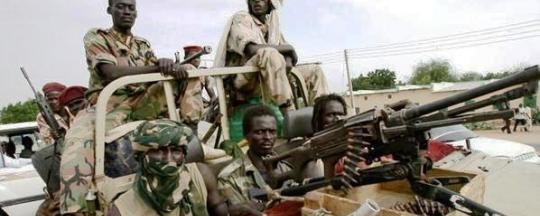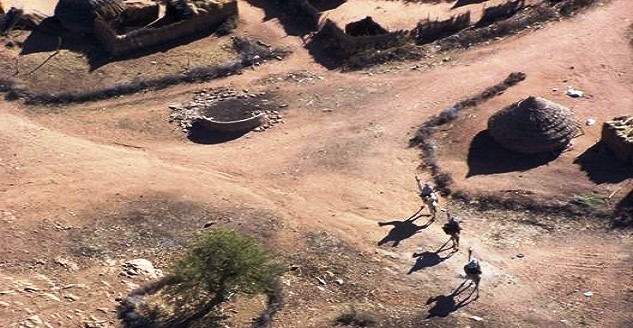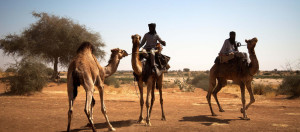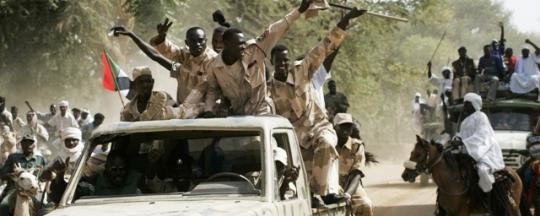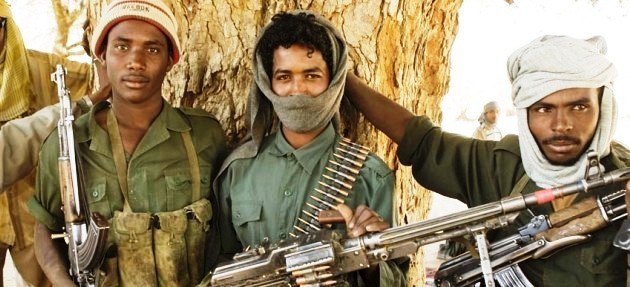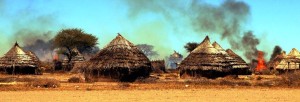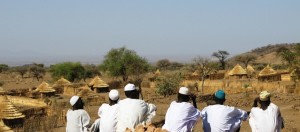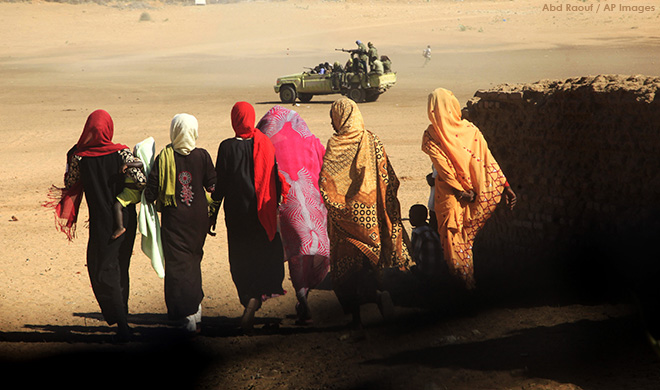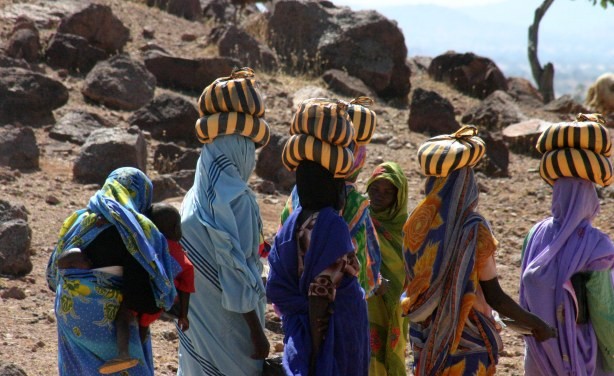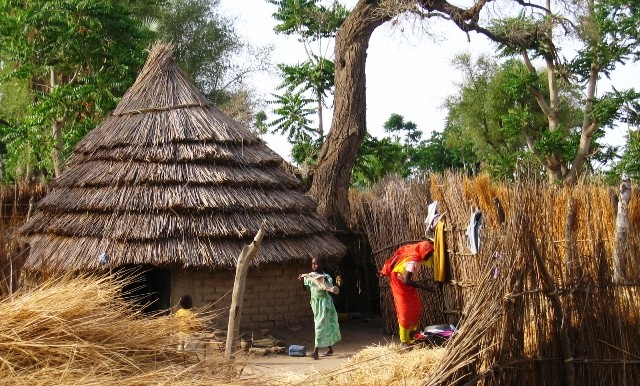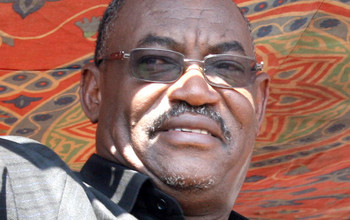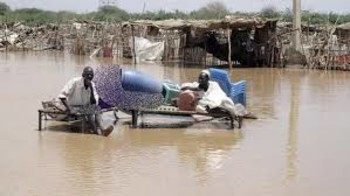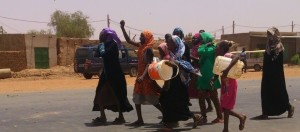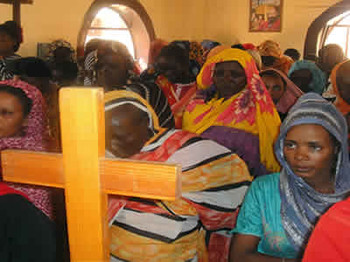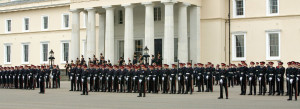This twentieth installment of Darfur: Radio Dabanga News Digest focuses on events of the past two weeks, especially violence and insecurity in North Darfur and the continuing deterioration of the Sudanese economy.
[The News Digest will appear henceforth on a biweekly basis; as a consequence, the greater number of dispatches during this longer period will often be reduced further in editing—sometime with only the title and URL appearing—and commentary will typically be briefer.]
Four primary focal points
[1] Of particular note over the past two weeks is the removal of Radio Dabanga from the Arab Satellite Communication Organization (Arabsat), this at the request of the Khartoum regime. The Arab world has long averted its eyes from Darfur, despite knowing of the massive slaughter and destruction that has occurred over the past twelve years and more. Now, by acquiescing before Khartoum’s demand that our most important source of reporting from the region be removed from ARABSAT, the Arab world gives further evidence of a vicious selectivity in which atrocities it allows its listeners to hear about.
[2] Despite some commendable efforts by the UN/African Union mission in Darfur (UNAMID), the situation on the ground throughout Darfur—and especially North Darfur—continues to descend further into a maelstrom of uncontrollable violence. Security for civilians is non-existent, and casualties from all causes continue to mount at an appalling rate. There are signs of growing inter-communal conflicts pitting Arab tribal groups against African tribal groups, as well as inter-Arab conflicts that are of great concern. Darfuris in the Khartoum area continue to face extreme harassment and frequent violence.
[3] Another section of dispatches has as its primary concern the continuing economic disintegration in Sudan and the consequent threats to basic food and water supplies throughout the country. The growing water crisis in Sudan has hit Darfur especially hard. The consequences of economic implosion in Sudan are also evident in many dispatches.
[4] Political developments continue to accelerate in Sudan, and African Arguments recently published an excellent dispatch by Hamid E. Ali (American University in Cairo) and Ahmed Hussain Adam (fellow at Cornell University), “Bashir’s Autocratic Regime is Fighting for Its Survival” (July 17, 2015). The move towards an increasing militarism and reliance on the security services is most conspicuous, but even harsher press censorship of news reporting is also notable. The number of demonstrations, especially by women, over a range of concerns has grown significantly. Additionally, it has become clear that some within al-Bashir’s regime are facilitating the movement of Sudanese citizens to join the Islamic State (ISIS/ISIL). Finally of note on the political front, the UK government continues to defend its outrageous assistance to Sudanese military forces—the only country in the world besides Iran to do so.
[For previous Radio Dabanga Digests, see:
Darfur: Radio Dabanga Digest, Number 1 | http://wp.me/p45rOG-1CD
Darfur: Radio Dabanga Digest, Number 2 | http://wp.me/p45rOG-1De
Darfur: Radio Dabanga Digest, Number 3 | http://wp.me/p45rOG-1Dt
Darfur: Radio Dabanga Digest, Number 4 | http://wp.me/p45rOG-1Ei
Darfur: Radio Dabanga Digest, Number 5 | http://wp.me/p45rOG-1EL
Darfur: Radio Dabanga Digest, Number 6 | http://wp.me/p45rOG-1Fp
Darfur: Radio Dabanga Digest, Number 7 | http://wp.me/p45rOG-1FL
Darfur: Radio Dabanga Digest, Number 8 | http://wp.me/s45rOG-6452
Darfur: Radio Dabanga Digest, Number 9 | http://wp.me/p45rOG-1Gi
Darfur: Radio Dabanga Digest, Number 10 | http://wp.me/p45rOG-1Gt
Darfur: Radio Dabanga Digest, Number 11 | http://wp.me/p45rOG-1Hq
Darfur: Radio Dabanga Digest, Number 12 | http://wp.me/p45rOG-1HY
Darfur: Radio Dabanga Digest, Number 13 | http://wp.me/p45rOG-1Ia
Darfur: Radio Dabanga Digest, Number 14 | http://wp.me/p45rOG-1II
Darfur: Radio Dabanga Digest, Number 15 | http://wp.me/p45rOG-1Ji
Darfur: Radio Dabanga Digest, Number 16 | http://wp.me/p45rOG-1JU
Darfur: Radio Dabanga Digest, Number 17 | http://wp.me/p45rOG-1Kp
Darfur: Radio Dabanga Digest, Number 18 | http://wp.me/p45rOG-1L7
Darfur: Radio Dabanga Digest, Number 19 | http://wp.me/p45rOG-1Lm
Darfur: Radio Dabanga Digest, Number 20 | http://wp.me/p45rOG-1LM —and below
Sudan Tribune has again been the source of several key reports on Darfur and the growing political crisis.
[All emphases in all quoted material (in bold) have been added; all editorial comments are in italics, in blue, with my initials following; a useful and quite recent administrative map of Darfur appears here.)—ER]
Eric Reeves, 19 July 2015
[1] ArabSat removes Radio Dabanga from its satellite | Sudan Tribune | July 17, 2015 | Khartoum
The Arab Satellite Communication Organization (ArabSat) has removed the radio station Radio Dabanga from its satellite upon a request from the Sudanese government, said a statement released by the radio on Friday. Radio Dabanga is a shortwave radio station that serves the Darfur area of western Sudan. It is based in the Netherlands and it has been broadcasting in Arabic and local languages since December 1, 2008. The radio was the first media outlet to report accusations last November that Sudanese soldiers had raped some 200 women and girls in Tabit, a village 45km southwest of North Darfur capital El Fasher.
Mohamed Karim Mahmoud, product marketing manager of Arabsat Broadcast Services, said the decision to remove the radio station was based on a formal complaint he had received on the 24th of May 2015 by the Sudanese ministry of information, said a statement issued by the radio station. “The station is considered to be hostile to the Sudanese government,” said ArabSat in its announcement to stop Radio Dabanga broadcasting.
Asked by the uplink company whether there was any item or programme considered to be hostile to the Sudanese authorities, ArabSat answered, “We note that this complaint concerns the whole radio station [Radio Dabanga], and not to a specific news item.”
Radio Dabanga asked its listeners to follow its programmes everywhere in Sudan on Nilesat 7 degrees frequency 12399 Symbol Rate: 27500 Polarity 6/5.
[This represents a craven capitulation by ArabSat and further demonstration of the selective concern of Arab countries in responding to the extraordinary suffering of the people of Darfur, all of whom are Muslim. By failing to carry Radio Dabanga, RadioSat has made itself complicit in the broader effort by Khartoum to render Darfur invisible. The international community as a whole has been far too accommodating of these efforts.]
[2] North Darfur has collapsed into violence chaos, and other parts of Darfur seem poised to follow suit; urgent humanitarian needs are going unmet as morbidity and mortality increase significantly
• North Darfur terrorised by “Tawila militia forces” | July 15, 2015 | Tawila Locality
Within the past three weeks of the Islamic fasting month of Ramadan, 41 people were abducted and 22 vehicles hijacked in North Darfur, by a group of militia forces stationed near Tawila. “Those Janjaweed have set up their headquarters in the Uwein Mountains, northwest of Tawila,” a kidnapped man who managed to escape from a militia camp, told Radio Dabanga. He reported that the militia forces make use of 35 Land Cruisers to terrorise the areas of Tawila, Kutum, Kabkabiya, and Saraf Umra. “Ten of the vehicles belong to the paramilitary Rapid Support Forces, ten others to the Damirat El Gubba militia, led by Abu Kineish, and the rest belongs to militiamen from Kabkabiya and Saraf Umra.” “The people captured to extort ransom from their relatives, are subjected to beatings and torture,” he reported. “They are tied with ropes and chains, and forced to work as servants.” The escapee described the militiamen as “government-backed terrorists, impoverishing the people by robbing and blackmailing them.”
Militia forces in North Darfur
[This is life as it is lived by people in North Darfur every day—with no relief in sight and no improvement in protection possible without a major enhancement of UNAMID—ER]
• Herder killed, village plundered in North Darfur’s Tawila | July 13, 2015 | Tawila Locality
A herder was murdered in Tawila locality, North Darfur, on Sunday. Government-backed militiamen attacked the village of Kafalo, south of Tawila town. Speaking to Radio Dabanga, Omda Mukhtar Bosh, coordinator of the Tawila camps for the displaced, said that Saleh Mohamed Abdallah was shot dead in Jebel Karo, southwest of Tawila town. “While he was grazing his cattle on Sunday morning, Janjaweed on camels arrived, and fired at him. Abdallah died instantly. They then took his 80 cows, and fled.” He further reported that a group of militiamen riding in two vehicles stormed Kafalo village, south of Tawila, on the same morning. “They plundered the entire village, after which they torched almost all the houses.”
Militia forces leaving a recently plundered village in North Darfur
[Khartoum is allowing various militia forces to resume the strategy that defined the early years of genocide in Darfur: destroy or displace the African tribal populations in Darfur as a means of weakening the rebel forces. It is the most brutal form of counter-insurgency strategies and thrives on the kind of violent chaos everywhere evident in Darfur, if concentrated at present in North Darfur—ER]
• Darfur displaced robbed of relief items, livestock | July 13, 2015 | East Jebel Marra / Tawila
Militiamen have stolen a number of relief items delivered to displaced in East Jebel Marra. [This represents an extremely dangerous trend, one that may compromise humanitarian efforts to such a degree that relief organizations may feel compelled to withdraw from Darfur—ER] Others robbed residents of the Shangil Tobaya camps in Tawila locality, North Darfur, of their livestock.
[Livestock often represent the entirety of a family’s wealth in Darfur; the huge numbers of cattle, camels, and other livestock that have been killed, left to die for lack of water—or stolen—has over the past twelve years impoverished the people of Darfur to an almost incomprehensible extent. Many tens of billions of dollars in losses have been incurred—ER]
• Militiamen extort displaced farmer in Saraf Umra, North Darfur | July 13, 2015 | Saraf Umra
A resident of El Jebel camp for the displaced in Saraf Umra, North Darfur, was forced to pay SDG10,000 ($1,680) on Saturday, as compensation for his alleged killing of a cow last week. Sheikh Abdelrazig Yousef Suleiman, coordinator of the Saraf Umra camps, reported to Radio Dabanga that four militiamen, two of them wearing uniforms of the Central Reserve Police (locally known as Abu Tira) and two in civilian clothes, came to El Jebel camp on Saturday. “Those Janjaweed ordered Mohamed Suleiman Khamees to pay blood money for a dead cow they had put behind his farmland at Wadi Kulkul, east of the camp, last week,” he said. “They made him pay half of the amount on Saturday, and threatened to kill him and take over his land cultivated with onions and his guava and lemon orchards, if he does not pay the rest within two weeks.”
[These crude extortion schemes by Arab militiamen, often attributing absurd acts of livestock killing to African farmers and camp residents, have become extremely common—and dangerous: people may soon be forced to fight back even without comparable weapons if the alternative is starvation for their families—ER]
• Herders threaten farmers, livestock destroys crops in North Darfur | July 12, 2015 | Kabkabiya / Kutum
Militant herders in Kabkabiya locality, North Darfur, have put farmers before the choice to pay a part of their yields to them, or to immediately stop tending their farmlands. In neighbouring Kutum locality, livestock released by force on farmlands destroyed large quantities of crops. [A] farmer reported from Shawa…that any farmer who wishes to cultivate his land, has to pay at least one third of his harvested crops, as “rent” for the land. He explained that the land was originally owned by the farmers. “But the herders, armed by the government, forcibly evicted us.”
Farmers in the western part of Kutum lost most of their crops when herders released their camels and cattle on farmlands, orchards, and vegetable gardens in the area of Naro, Abu Shouk, and Rotaba during the past few days.
Arab camel herders that are so feared by African farmers in North Darfur
[This cycle of extortion, “rental fees,” and outright destruction of crops is transforming Darfur; along with rape, murder, and armed robbery, these actions are making any possible reconciliation between Arab and African tribal groups almost unimaginably difficult—ER]
• Thuggery in North Darfur: five people killed, boy abducted | July 10, 2015 | Mellit / Tawila
Armed robbers killed five villagers in Mellit locality in North Darfur on Thursday. They also took the residents’ money, properties and cattle.
Witnesses reported on Friday that the entire Ein El Das village was burned by the attackers, resulting in the exodus of the residents to Mellit town. Five of them were killed by gunfire, while three others sustained injuries. Raids, banditry and abductions have resulted in a grown insecurity in North Darfur state, particularly in the localities surrounding El Fasher.
On 30 March, militiamen reportedly killed 41 villagers in Mellit. When they passed through Malawi later, the raiders robbed nearly 100 camels and money from the residents.
On Thursday, a child fell victim to one of the frequent kidnappings in the region. Gunmen abducted the 8-year-old from Rwanda camp for displaced people in Tawila locality, and demanded his family to pay a ransom for his release. “They informed his family that they demand SDG20,000 [$3,330] for his release.” The boy just entered his first basic school year.
The commander of the military garrison in Tawila already told displaced people in May that a force will be established to act against any soldier or militiaman, who dares to assault and rob civilians in the locality. But the raids, attacks, and hijacks by militiamen in the area have continued to terrorise the population, including the displaced….
In a road accident in Mellit locality, eight people were injured when their vehicle overturned. A witness told Radio Dabanga that the bus was on its way from El Fasher to Abbas, in the area of Um Araheik. The driver spotted a military convoy of the Sudanese army in the distance. In an attempt to avoid passing the convoy, the driver took a turn, ending up at the side of the road, after which the bus overturned.
Khartoum’s “thugs”—stripping the remaining wealth from Darfuri African tribal groups
• Two young men killed in Darfur’s Jebel Marra | July 10, 2015 | Fanga
Two young men were killed by militiamen on Friday, near Fanga in East Jebel Marra. A relative of Yousef Haroun Ahmed (aged 17) and Ismail Yagoub (21) reported the incident to Radio Dabanga. “Members of the Rapid Support Forces, driving in two vehicles, intercepted Yousef and Ismail when they were returning from their farmlands. “The militiamen opened fire on them and they were killed on the spot.” Ahmed and Yagoub lived in Dolo village, 5km north of Fanga.
• Nine dead in Border Guards attacks on market, villages in North Darfur | July 16, 2015 | El Fasher Locality
At least nine people were killed and nine others were wounded on Tuesday in attacks by militiamen and elements of the paramilitary Border Guards on the market of Kafod and surrounding villages in El Fasher locality…
“Janjaweed plundered more than 40 shops and stalls. One group loaded the goods in their four-wheel-drive Land Cruisers, and two hijacked vehicles, and left towards their base in the area of Umsayyala, north of Kafod,” he said. “Not much later, another joint group of Border Guards and militiamen attacked the villages of Lombati, Khardal, Hillet Shamouta, and Um Arda. “Five villagers were killed, and seven were injured,” the vendor said, adding that 300 head of livestock were stolen.
[Everyone in North Darfur on the ground—including UNAMID—knows where many of the militia forces are based; this has not led to any preemptive action by UNAMID—ER]
• Militiamen kill two, injure two in separate incidents in Darfur | July 17, 2015 | North / South Darfur
A man on his way to celebrate Eid-al-Fitr with his family was shot dead by government-backed militiamen in North Darfur on Thursday.
In a separate incident on the same day, “a gang of looters” killed a civilian in South Darfur. Both companions of the victims were injured during the incidents.
• Militiamen assault displaced, plunder shops in Darfur | July 6, 2015 | Shangil Tobaya / Nierteti
Three displaced women sustained various injuries in an attack by militiamen near Shangil Tobaya camp in North Darfur’s Tawila locality on Saturday.
A group of gunmen pillaged the market of Nierteti in Central Darfur. “Those Janjaweed intercepted the women, aged 18, 29 and 32 years, when were on their way to collect firewood north of the camp. They severely beat them,” Omda Mukhtar Bosh, coordinator of the Tawila camps for the displaced reported to Radio Dabanga. He said that the women are currently being treated at the health centre of the camp.
• Three militiamen rape two women in Darfur’s East Jebel Marra | July 15, 2015 | East Jebel Marra
Two young women were raped on their farmland in East Jebel Marra on Tuesday. A relative of the victims informed Radio Dabanga that the assault occurred west of Sharafa village, where the two women, aged 21 and 18, were tending their crops. “Three militiamen riding on camels entered the farmland at noon, during fasting time,” she said, “and raped them alternately for hours.” She added that the victims are being treated at home with traditional medicines.
[The epidemic of sexual violence in Darfur rages on, although it rarely figures centrally in discussions of insecurity in the region—ER]
• Passengers robbed, driver shot in Tawila, North Darfur | July 14, 2015 |Tawila Locality
Gunmen robbed the passengers of a commercial vehicle in Tawila locality, North Darfur, on Sunday. In an attack on another vehicle, the driver sustained serious bullet wounds. Omda Mukhtar Bosh, coordinator of the Tawila camps told Radio Dabanga that a group of gunmen riding on camels intercepted a commercial vehicle on the road between Zamzam camp for the displaced and Tawila town.
• Gunmen kill farmer in South Darfur, cattle owner in East Jebel Marra |July 15, 2015 | Gireida / Mashrou Abu Zeid / Kabkabiya
Armed robbers shot dead a farmer near Gireida in South Darfur on Monday.
In Kabkabiya, North Darfur, gunmen hijacked a commercial lorry. Speaking to Radio Dabanga, a relative of the victim reported that a group of gunmen raided Yahya Yagoub’s farm in the area of El Asal, west of Gireida town, at about 11 am. “After they had killed him, they took his horse and his cart, and fled.” He said that the police of Gireida refused to register the complaint, lodged by Yagoub’s family…
In East Jebel Marra, 41 year-old Mahjoub Abdelgader was killed by militiamen inside his home at a nomad settlement in Khor Nasir, south of Mashrou Abu Zeid, on Monday evening. A neighbour told Radio Dabanga that four militiamen riding on camels raided Abdelgader’s premises at 9 pm, with the purpose of stealing his cows. “The militia members threw him on the ground, whereupon one of those Janjaweed took of his knife and butchered him in front of his children and his wife. They then left, taking a camel and 41 cows from his herd with them,” he said.
Gunmen such as these are everywhere in Darfur, especially North Darfur; Khartoum allows them to operate with complete impunity
• Masked gunmen repeatedly attack Um Keddada, North Darfur | July 15, 2015 | Um Keddada
Since five days, masked gunmen are creating havoc in the northeastern North Darfur town of Um Keddada. On Tuesday, they hijacked a vehicle of the Agricultural Bank. “A group of those gunmen threatened the driver in downtown Um Keddada, after which they took the car towards El Kuma, in the west,” an eyewitness reported to Radio Dabanga.
• Five dead in North Darfur militia shootings | July 14, 2015 | El Fasher Locality
Five people were killed, and another was wounded during shootings in El Fasher locality, North Darfur, on Tuesday. A trader at the market of Kafod, near Korma, told Radio Dabanga that fierce fighting broke out during a funeral, after two paramilitaries of the Popular Defence Forces (PDF) and a militiaman were fatally hit by bullets at the Kafod market, near Korma, on Tuesday morning. “It all started with a quarrel inside the market between PDF troops and militiamen.
[The various militia forces in Darfur, with the possible exception of the Rapid Support Forces, do not coordinate with one another and are often engaged in “turf battles.” As the economy of Darfur continues to collapse along with that of the rest of Sudan, it is likely that greater violence will be used in extortion schemes, ransom demands for kidnapped victims, robbery, and exorbitant “rental” demands of African farmers—ER]
• Seven dead in Ziyadiya attack on Berti villages in North Darfur | July 6, 2015 | Mellit Locality
Seven people were killed and others wounded in an attack by paramilitaries of the Border Guards and the Central Reserve Police (locally known as Abu Tira) on six villages in Mellit locality, North Darfur, on Sunday. Multiple sources reported to Radio Dabanga from the locality that a large group of militiamen, belonging to the Ziyadiya tribe [an Arab tribe—ER], riding in 17 Land Cruisers, and attacked villages populated by people from the Berti tribe [an African tribe—ER]. “They raided Hillet Abdelrahim, Hillet Hashab, Bambatafei, Sangarei, Abu Jira, and Soug El Khamis, randomly firing around them.
“The Ziyadiya robbed the villagers of hundreds of livestock, and took them into the direction of El Koma,” he added. Last February and March, Ziyadiya militias launched several attacks on Berti villages in Mellit locality. 106 villagers were killed. According to reports from Mellit early April, nearly 50,000 people were affected by the violence, more than 7,400 families were displaced, and at least 190 houses went up in flames.
Wholesale destruction of villages remains all too common in Darfur
[This is genocidal counter-insurgency—fully countenanced and encouraged by Khartoum. There is no meaningful police force, judiciary, or disciplined military presence by the Sudan Armed Forces (SAF). In such an environment, the presently authorized UNAMID civilian protection force will continue to prove almost wholly impotent in halting ethnically targeted destruction—ER]
• Farmers in Kutum, North Darfur, demand protection | July 14, 2015 | Kutum
Farmers in the area of Fata Borno, in Kutum locality, North Darfur, whose crops were destroyed by livestock released on their lands last week, demand protection and justice. In a petition submitted to the commanders of the Kutum military garrison and the paramilitary Border Guards in the locality on Monday, the farmers call for the formation of an inventory committee to assess their losses and arrange for compensation.
Large quantities of melons, tomatoes, radishes, okra, cress, and onions, as well as mangos, oranges, lemons, and grapefruit were destroyed, an affected farmer reported to Radio Dabanga on Friday. The losses are estimated at tens of thousands of pounds.
After an absence of the police and the judiciary in Kutum for more than three years, the North Darfur authorities decided last week to send a force of 500 policemen to the locality, to restore law and order. Three prosecutors and two judges will accompany the police force that will include 250 security police officers.
[Given the extremely heavy arms carried by the militia forces, the “police” deployed to Kutum—a major town—will always have to give way before increasingly emboldened militiamen. The judges won’t dare try members of the Rapid Support Forces, the Abu Tira, the Popular Defense Forces, or indeed any of the militia forces most responsible for the crime and violence in North Darfur—ER]
Men are obliged to watch for attacks my militia forces much of the time
• Gunmen rape two women in Darfur’s East Jebel Marra | July 10, 2015 | Mashrou Abu Zeid
Five gunmen have raped two women in Darfur’s East Jebel Marra, under the threat of arms. A woman from the area spoke to Radio Dabanga about the incident. “The rape occurred on Thursday at Mashrou Abu Zeid, in Goz Dor. Two women had gone out to fetch firewood. “Gunmen intercepted them, pointed their weapons at their faces, and ordered them to take off their clothes and lie down,” the woman said. The men then repeatedly raped the two.
Women such as these are the targets of rape in Darfur
• Passenger vehicles hijacked near North Darfur camp | July 10, 2015 | Khazan Tunjur
Armed robbers ambushed two vehicles with twelve passengers on board near Zamzam camp for the displaced in North Darfur, and took them to an unknown destination. A relative of one of the kidnapped passengers reported that the two Nissan vehicles, also carrying charcoal and firewood from Mortal, was intercepted by gunmen in the area between Khazan Tunjur and Tarnei. The cars were on their way to the Zamzam camp. “We do not know where they have taken the twelve passengers,” he told Radio Dabanga.
[We may be virtually certain that the twelve abducted persons are being held for ransom—ER]
• Berti, Ziyadiya sign “cessation of hostilities” in North Darfur | July 14, 2015 | El Fasher
Leaders of the Berti and Ziyadiya tribes on Monday signed a cessation of hostilities agreement in the North Darfur capital of El Fasher.
After some years of relative calm, a series of clashes erupted between the two tribes in Mellit locality last March. Ziyadiya tribesmen, many of them members of the paramilitary Border Guards and Central Reserve Police, attacked several villages populated by Berti in the locality. According to reports from Mellit on 12 April, 106 people were killed, and191 houses went up in flames. A total of 48,819 people were affected by the violence. 7,409 families were forced to flee their homes.
[We must be hopeful, though not optimistic, that this “cessation of hostilities” will hold—ER]
• UNAMID peacekeepers repel North Darfur attack | July 17, 2015 | El Fasher
Unidentified armed men aboard a gun-mounted vehicle opened fire on a UNAMID patrol team near the mission’s site in North Darfur last Wednesday. The peacekeepers returned fire until the perpetrators dispersed and ran away. The attack occurred between Bowa and Turmes villages, just 18 kilometers northwest of UNAMID’s team site in Kutum.
[Sadly, it must be counted a UNAMID victory when they are able to fend off attacks on their own personnel, although not always successfully. But let’s be clear: this is not in itself civilian protection—ER]
• Two army soldiers rape young mother in Central Darfur | July 8, 2015 | Nierteti
A young mother of a one-year-old girl was raped in Wadi Dari near Nierteti in Central Darfur on Wednesday. The father of the victim told Radio Dabanga that his daughter (18) was assaulted at about 9 am, when she was on her way, with her baby on her back, to her farmland in Dari Valley. “They took her at gunpoint to the bottom of the valley, where they threw her daughter into the bushes. They then raped her alternately,” he said. He expressed his abhorrence, not only about the assault of his daughter, but also about the fact that the soldiers raped her during fasting time. Passers-by found her in a very bad physical and mental condition. She was taken to Nierteti Hospital for treatment.
Which of these women will be raped? Will anyone care in the world outside Darfur?
[The headline for this story—excruciating on its own terms—is significant because if refers to “army soldiers,” a term used for members of the regular SAF—ER]
• Car owner slain, two passengers injured in Central Darfur ambush | July 12, 2015 | Zalingei Locality
A resident of the Hassahissa camp in Zalingei locality, [formerly West] Darfur, was killed, and two displaced women sustained serious injuries in an attack by militiamen on Saturday morning. “Two militiamen, wearing military uniforms, intercepted the commercial vehicle of Abdelmajed Mohamed Abdallah (35), carrying four passengers who were on their way from Murnei in West Darfur…
[The suggestion in some quarters that West Darfur is somehow “secure enough” to function without a civilian protection force is vicious mendacity—ER]
• New settlers evict West Darfuri farmers from their lands in Sirba | July 8, 2015 | Sirba Locality, West Darfur
A farmer was wounded in an attack by new settlers in Sirba locality, West Darfur, on Tuesday morning. “The newcomers attempted to prevent us from cultivating our lands,” one of the affected farmers told Radio Dabanga from the area of Goz Bagar. “When we refused to leave, they attacked us with their sticks, seriously injuring Ishag Yahya,” he said. “As they were in the majority, they managed to evict us.”
In recent years, Darfuris have been complaining about African and Sudanese Arab settlers occupying abandoned villages in the war-torn region. [S]ince June this year, Radio Dabanga [has received] reports about thousands of settlers occupying plots in deserted areas in East Jebel Marra. Local pastoralists identified them as members of Arab militias and migrants from Chad, Niger, and Mali. Several sources told Radio Dabanga that they spotted paramilitaries of the Rapid Support Forces (RSF), commanded by the Sudanese security apparatus, roaming around to protect the newcomers. Militant settlers also torched a number of villages, left by their residents during widespread attacks by the RSF during the first months of this year.
Too many African Darfuris have been forced from their homes, such as these, and continue to be displaced at rates that make peace daily more difficult to imagine
[The seizure of African lands by Arab immigrants from other parts of Sudan, Chad, Niger, and Mali continues to represent the single greatest threat to an end to the violence and a true and just peace agreement. Those who continue to push the diplomatic “dead letter” that is the Darfur Document for Peace in Darfur (sponsored by the expedient Qataris) simply refuse to accept that the DDPD has done nothing to halt this process of land appropriation—typically appropriation of lands abandoned because of security concerns. Until this critical problem is addressed in a meaningful way, peace will never come to Darfur. This is the primary reason Khartoum insists that the DDPD remain the only venue for any further peace negotiations on Darfur—ER]
• Killings, hijack, abduction in Darfur | July 8, 2015| El Ferdous / Nyala / Tawila / El Mahla
A member of a “rescue team” was killed in East Darfur on Monday. A paramilitary of the Border Guards was stabbed to death in Nyala, capital of South Darfur. Militiamen hijacked two pick-up trucks in North Darfur’s Tawila. Last week, two people were abducted in El Malha by a group of Border Guards.
Speaking to Radio Dabanga from El Riad in East Darfur’s Ferdous locality, a listener reported that Osman Hamed was shot dead and two others were wounded on Monday afternoon, in a clash between cattle thieves and a local rescue team in the area.
In Nyala, a Military Intelligence officer stabbed a member of the Border Guards several times with a knife on Monday. [Military Intelligence is the “big dog” for the Khartoum regime in Darfur—ER]
In Tawila locality, a group of militiamen intercepted two Hilux pick-up trucks carrying six vegetable traders from the Mortal market, near Khazan Tunjur, to Tawila town.
One of the affected traders reported that the attackers ordered the drivers and the passengers to disembark at gunpoint, after which they took the both vehicles to an unknown destination.
Rahma Ibrahim Adam and El Tayeb Adam Bakhit were seized by a group of Border Guards, led by someone nicknamed “Douda,” in the area of Abu Geran in El Malha locality, North Darfur. “They accused them of stealing their camels, and took them to an unknown destination,” a relative of the abductees said.
• Gunmen shoot, beat up, threaten people in South Darfur’s Gireida | July 6, 2015 | Gireida Locality
On Saturday, a farmer was seriously injured in an attack by gunmen in Gireida locality, South Darfur. Two others were wounded in a separate assault. The village of Bayata was surrounded by militiamen for 12 hours. Speaking to Radio Dabanga, a farmer reported that gunmen on horses, and wearing military uniforms stormed the land of Habib Ibrahim Yaqoub, at Wadi Shangalei, south of Gireida. “They intended to rob Yaqoub. When he resisted, they shot him. He was transferred to a hospital in Gireida in critical condition.”
[The potential for a massive flare-up of violence in South Darfur is very considerable, especially if we consider “East Darfur,” formerly part of South Darfur—ER]
• One dead, another injured in South Darfur robbery attempt | July 16, 2015 | El Radoom
A man was shot dead and another sustained bullet wounds in an attempted armed robbery in El Radoom locality on Tuesday. A listener told Radio Dabanga that the vehicle of Fadul Abdallah Yasin was intercepted by a group of gunmen in the area of Abu Kir. “Yasin was, with some people, on his way from Buram to El Radoom, when those outlaws fired at the car. He was killed instantly.”
• Cattle owner killed in South Darfur | July 9, 2015 | Nyala Locality
Cattle owner Mohamed Salami Omar was shot dead in the area west of Nyala, capital of South Darfur, on Tuesday. Speaking to Radio Dabanga, an eyewitness said that Omar was on his way from Um Libasa to the Nyala livestock market, when three militiamen opened fire at him in the area of El Sheikh Abdelbagi. “He died on the spot, after which the culprits took his cattle, and fled,” he reported.
• Two wounded in chase, hijack in South Darfur capital | July 7, 2015 | Nyala, South Darfur
The driver of a mini-bus belonging to the AU-UN Mission in Darfur (UNAMID) was shot by gunmen during a chase in Nyala on Sunday. The peacekeeping mission reported that a pregnant woman passing by was hit by the mini-bus, but managed to give birth to her baby through a C-section in the UNAMID hospital that day. A witness told Radio Dabanga that the gunmen chased the mini-bus with their vehicle on Sunday afternoon at El Matar street. The chase started at the Banks complex in Nyala, South Darfur’s capital. The men opened fire on the mini-bus driver, shooting him in the arm, but he did not pull over. “The driver then lost control of the mini-bus and ran over a pregnant woman on the road. She has been taken to the hospital, in a critical condition.”
[Nyala is not only the capital of South Darfur, it is the largest city in Darfur; it is far from secure and violent criminal activity is a commonplace. Khartoum refuses to provide meaningful security even for this major city—ER]
• Habaniya, Rizeigat clash in Sunta, South Darfur | July 5, 2015 | Sunta Locality
At least six people were killed and nine others injured on Saturday, in clashes that broke out between Rizeigat and Habaniya tribesmen in El Sunta locality, bordering East Darfur. Ali El Taher Sharef, deputy-governor of East Darfur, told reporters in the state capital of Ed Daein that clashes erupted after a group of Rizeigat had stolen a number of cows belonging to the Habaniya.
[Fighting between these two Arab tribal groups is of growing concern in East and South Darfur—ER]
• UNAMID says alarmed by fresh tribal clashes in South Darfur | Sudan Tribune, July 17, 2015
The African Union United Nation Mission in Darfur on Thursday said alarmed by reports about the escalation of tribal violence between Reizegat and Habaniya groups in South Darfur this week. Reports from the South Darfur say over 17 persons were killed when the fighting between the two tribal groups erupted on Tuesday 14 July in Al-Sunt locality, 150 kilometres southeast of the state capital Nyala.
• UNAMID, Umma Party condemn tribal fighting in South Darfur | July 16, 2015 | El Fasher / Nyala / Buram
UNAMID and the National Umma Party have expressed their concerns about the fierce clashes between Rizeigat and Habaniya tribesmen in El Sunta locality, South Darfur, on Tuesday. The governor of South Darfur has dismissed the commissioner of El Sunta. Government troops have been sent to the area to contain the situation. In a press release today, the joint UN-AU Mission in Darfur “strongly urges the leaders and members of both tribes to exercise maximum restraint, engage in meaningful dialogue to resolve their disputes, and refrain from all acts that would lead to further intensification of violence, loss of life, and potential displacement of innocent people.”
• South Darfur governor: “Shoot to kill, dig trench around Nyala to curb insecurity” | July 9, 2015 | Nyala, South Darfur
The newly appointed governor of South Darfur has ordered police and security forces in the state to “kill any outlaw” in case they offer resistance or refuse to comply with their directions. Speaking at a ceremony organised by the South Darfur authorities for the Popular Police Forces in Nyala on Wednesday, Governor Adam El Faki said that the rampant insecurity in the state capital should be curbed by all means. He also addressed the army forces, telling them to “just fire an RPG missile at any hijacker. Just finish off the thief and the vehicle!” [Collateral civilian damage does not seem to be one of el-Faki’s concerns—ER]. The authorities will not be obliged to pay “blood money” for perpetrators liquidated in this way, he stressed. El Faki also warned the regular forces, “be them army or militia troops,” that if one of them is caught red-handed in any crime, “he will be tried by a firing squad.” [The conflation of punishment with a legal trial is all too characteristic—ER]. The former governor of South Kordofan urged the population of Nyala to resist any assailant, “even if you have to kill him,” and told them to provide the security forces in the state with “any information about outlaws and their hideouts.” [El-Faki seems blissfully unaware of the dangers in taking on the role of informant; moreover, as Radio Dabanga dispatches reveal, the location of those most responsible for violence is well known. This would seem to be inconvenient for the bloodthirsty and ham-fisted new governor of South Darfur—ER]
South Darfur’s brutal new governor, Adam El Faki: “shoot first and ask questions later”
In order to further restore security in Nyala, El Faki said that he ordered the digging of a trench around the huge million-city. “There will be seven passageways left, to prevent the hijack of cars. In addition, a CCTV system will be developed with 60 monitoring cameras.” “In addition, each neighbourhood will be surrounded by a security fence, to prevent the escape of perpetrators, who should better be killed immediately.”
[These would seem to be the murderous ravings of someone with no conception of how the world actually functions—ER]
In response to the governor’s speech, lawyer and senior member of the South Darfur branch of the Sudanese Communist Party, Adam Sharif, told Radio Dabanga in an interview to be broadcast on Friday that the people hoped for a new government that would restore the rule of law in the state. “Yet we were shocked to hear these weird statements from the governor that will certainly lead to chaos. El Faki seems not to care about violating the Sudanese law, the Constitution, and the Universal Declaration of Human Rights.” For his part, Mohamed Abdelsalam, co-vice president of the National Umma Party in South Darfur, commented that no authority has the right to pass the judiciary and order the “shooting to kill” under the rule of law.
[Such sober words of caution are not likely to have much effect on El Faki, given his past. As Ali and Hussain point out in their articles on the al-Bashir regime:
The five governors of the Darfur states are either NISS officers or associated with the NISS and the Janjaweed. Hemeti and his Janjaweed militia (the Rapid Support Forces) have been given the upper hand in the new government and crowned as Bashir’s personal army.
The prominence of that National Intelligence and Security Services in governance is true throughout Sudan, but most conspicuous in Darfur—the expected form of “governance” is all too clear—ER]
• Central Darfur emergency laws grant powers to security forces | July 7, 2015 | Zalingei
Ja’afar Abdelhakam, the Governor of Central Darfur, announced the activation of emergency laws across the state, starting next Monday.
[Central Darfur is following the lead of South Darfur—ER]
Eid El Fitr: messages from Sudanese refugees and displaced | July 17, 2015 | Chad / Darfur
Sudanese living in camps for refugees in eastern Chad and displaced persons in Darfur send out their messages and wishes on occasion of Eid El Fitr that marks the end of the holy month of Ramadan. Refugees in eastern Chad hope Darfur will be “freed from violence and other heinous crimes,” and that the region will see stability again as other “Muslim countries” do. Zein Mohamed Ahmed, an activist living in camp Djabal, said refugees still remember celebrating Eid El Fitr in their own country and hope they are able to do that again soon. He said the 400,000 Sudanese refugees living in 13 camps in eastern Chad, face daily hardships due to the bad humanitarian conditions in these sites.
[Darfuri refugees in eastern Chad have some of the worst humanitarian indicators among the world’s refugees—ER]
• Storms destroy nearly 1,000 houses in South Darfur camp | July 17, 2015 | Kalma Camp
A total of 761 houses were partially or completely destroyed by heavy rains last Thursday in South Darfur’s Kalma camp. Humanitarian organisations are supporting Kalma’s residents with assessing the extent of the damage. Torrential rains that lasted from 12pm until 3am left “considerable damage” in different parts of the Kalma camp. Saleh Abdullah, the site’s secretary-general, said that 250 families who recently arrived at the camp had their homes completely destroyed.
Camps are too often flooded during the rainy season; shelters are typically flimsy, and camps have been located on lands that are often prone to flooding
[One might ask where a sense of national responsibility is for such calamities—the regime of Omar al-Bashir has other concerns, and would be just as happy to see Kalma destroyed in its entirety—ER]
[3] The Economy: Continuing to implode, ever more dangerously
• “Sudan’s debts will not be solved unless Al Bashir is ousted”: economist | July 6, 2015 | Cairo / Khartoum
Sudan’s external debts, amounting to more than $45 billion, will not be solved unless a regime-change takes place, says Prof Hamid Eltigani Ali, economist, and head of the Department of Public Policy and Administration at the American University in Cairo. Eltigani told Radio Dabanga that Sudan will only be able to take advantage of the economic agreements signed with regional and international bodies in case President Omar Al Bashir is ousted, and brought to trial at the International Criminal Court (ICC) in the Hague. “If the current situation does not change, the country will drown in its debts,” he warned. Sudan lacks creative economic visions and does not produce enough, while it continues to spend large amounts on the army, militias, and warfare.”
In 2013, Sudan’s debts reached $45.6 million, constituting 83 percent of its 2011 GDP. “If the current situation does not change, Sudan will drown in its debts.” Dr Sidgi Kabello, economist in Khartoum, confirmed to Radio Dabanga that the economic crises in the country will continue to grow “unless a real democratic alternative has been established.” He stressed that this can only be achieved “after Al Bashir and his National Congress Party (NCP) have been rooted out from Khartoum…”
Moreover, institutional corruption has become extremely high, he said. “The revenues of about 249 oil wells are not deposited in the public treasury. In reality, the total of oil revenues amount to $250 million, rather than the $70 million that appears in the financial reports. There must be about $180 million circulating outside the public treasury.”
The economist furthermore explained that the stability of the Dollar in Sudan is a result of money laundering. “A total of $3 million black market dollars came from Libya, the Central African Republic, and from NCP affiliates’ accounts held abroad.”
In its 2014 Index of Economic Freedom, the USA-based Heritage Foundation states that “Sudan is considered one of the world’s most corrupt countries. Power and resources are concentrated in and around Khartoum, and outlying states are neglected and impoverished. Members of the ruling party tightly control the national economy and use their wealth to buy political support.”
[Although there can be little doubt about the accuracy of the economic assessments here, the Obama administration Sudan policy continues to be guided by the bizarre views of former special envoy for Sudan Princeton Lyman:
“Frankly, we do not want to see the ouster of the [Sudanese] regime, nor regime change. We want to see the regime carrying out reform via constitutional democratic measures.” (Asharq Al-Awsat, December 2011)
Such an attitude consigns the people of Sudan to the terrible consequences of economic implosion, incipient even at the time of Lyman’s truly preposterous assessment—ER]
• “Khartoum state mortgaged plots up to $150 billion”: economist | July 16, 2015 | Khartoum
The value of land in Khartoum state, mortgaged to businessmen and banks, amounts to SDG900 billion ($150 billion), according to a prominent Sudanese economist. Prof. Esameldin Abdelwahab Bob told Radio Dabanga in an interview on Tuesday that mortgaging state territory “seriously undermines the national economy,” and stressed that mortgaging pieces of state lands is a crime that carries the death penalty. “It is a phenomenon not often seen in the world. How can authorities mortgage land that they do not own?” El Sudani newspaper last week published an article on the subject, quoting reliable sources that indicated that the mortgaged plots in Khartoum state include ministries’ premises, offices of several districts, and some hospitals and schools. The newspaper also reported that the newly appointed Khartoum state governor and former Defence Minister Abdelrahim Mohamed Hussein, told journalists during a Ramadan breakfast ceremony on 1 July, that the Ministry of Planning and Urban Development has sold all the plots.”
The economist said that the Sudan Investment Review, issued by the UN Conference on Trade and Development (Unctad) in December 2014, confirmed that the value of foreign assets (FDI stock) rose to $22.693 billion in 2014 from $1.3 billion in 2000 and just $55 million in 1990. [In other words, the mortgaging activity has occurred almost exclusively during the long NIF/NCP tyranny, which began in June 1989—ER] The Review reported Sudan ranks second among African countries that sell and lease parts of their territories.
[This extraordinary revelation, even if long suspected, gives a clear picture of how the regime has enriched itself, and how it has staved off some of the consequences of economic collapse. There could be no more self-destructive act for Sudan—ER
El Gezira Scheme
Bob added that the recent constitutional amendments have given President Omar Al Bashir the sole responsibility for the country’s territory. “Furthermore, the El Gezira Scheme Act allows for the selling of its farmlands. “This means,” the economist stressed, “that the Sudanese government has decided, in a final and comprehensive manner, to sell out its lands, especially in El Gezira state, lands that provide livelihood to thousands of Sudanese farmers.”
[The regime clearly continues to mortgage or sell as much of Sudan as possible to avert the coming economic meltdown—which can be delayed, but not forestalled, even with corruption on this scale—ER]
• One million Sudanese children not enrolled in basic schools: Ministry | July 14, 2015 | Khartoum
The Sudanese Ministry of Education reported on Sunday that about a million children in the country are not enrolled in basic schools. Most of them are girls living in the war-torn states in Darfur, South Kordofan, and Blue Nile. [This is the absurd figure promulgated by the regime in the hope that less attention will be given to the data coming from UNICEFP—ER]
According to UNICEF in Sudan, some 3 million children between the ages of 5 to 13, from pre-basic school level to lower secondary school level are deprived of their right to education. More than half of them are girls, UNICEF reported in a press statement on 31 May. A further 15 percent of the basis school pupils are at risk of dropping out before their final grade.
[Education in the peripheral regions of Sudan has been among the very greatest failings of the NIF/NCP regime, something that will want the future economy of Sudan long after the regime has been removed—ER]
• “Low scores, high drop-out rate in Darfur schools”: parents | July 7, 2015 | Nyala / Sirba
A large number of students in a South Darfur camp have abandoned the classrooms, according to parents, because of the fees imposed by the school administration . . .
[A grim and depressingly data-rich dispatch—ER]
• Aid organisations struggle to meet education needs in Darfur | July 9, 2015 | Khartoum
The reopening of schools in the Darfur camps for the new school year poses a significant challenge, as underfunding in the education sector is affecting education partners’ response capacities. With the current level of funding, the education sector will not be able to sustain the education response throughout the camps in Darfur. This lack of funding will affect some 32,000 newly displaced school children in North and Central Darfur.
[The full dispatch gives many others statistics, all indicating a collapse of primary education throughout Darfur, South Kordofan, Blue Nile, and much of Eastern Sudan—ER]
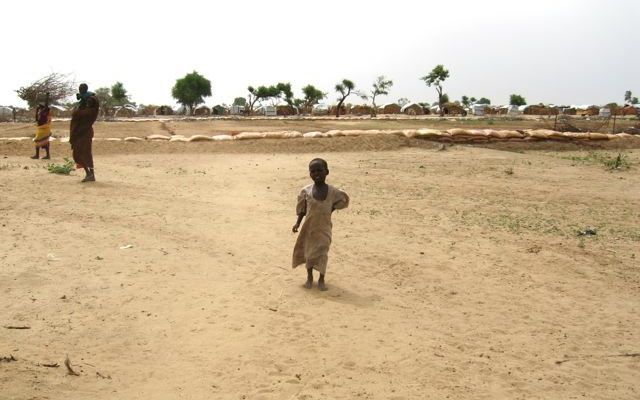 Tremendous number of orphans in Darfur and eastern Chad have little chance for education
Tremendous number of orphans in Darfur and eastern Chad have little chance for education
• Thirst in Sodari, North Kordofan | July 9, 2015 | Sodari, North Kordofan State
The population of Sodari and surroundings in North Kordofan are suffering from a severe shortage of drinking water since more than three weeks. “This Tuesday, not a drop of water was to be found in the entire area,” an angry resident of Sodari told Radio Dabanga. He attributed the crisis to the break-down of the pumps at the only water well in the area. The people of Sodari have twice staged a protest against the water outages during the past weeks, “to no avail,” he said, accusing the North Kordofan government of “inertia.”
[There are growing reports from across Sudan of an infrastructure crumbling, with the most conspicuous signs taking form as inability to pump or transport clean water. The current regime has never invested in infrastructure for the citizens of Sudan, and the consequences are increasingly clear. Coupled with the consequences of rapid inflation—likely over 50 percent—and an almost total lack of hard currency in the Central Bank of Sudan, shortages are inevitable and will become increasingly painful—ER]
• Sudanese protest against lack of water, power, and petrol | July 13, 2015 | Khartoum / El Gedaref
Protests erupted again in Khartoum, and also in eastern Sudan’s El Gedaref, against the ongoing drinking water crises and power cuts in both cities. In the Sudanese capital, angry residents of Abu Saad blocked the district’s main street on Monday, condemning the continuing shortage of drinking water and electricity outages.
The town of El Gedaref witnessed several demonstrations against water outages, occurring since more than five months, and the scarcity of petrol. People living in El Nazir Bakar, El abbasiya, Kerfes, and Borno districts took to the streets, and formed a mass rally demanding the uninterrupted provision of water and fuel.
Women demonstrating against water shortages in Khartoum
• Protests against water crisis continue in eastern Sudan’s El Gedaref | July 15, 2015 | El Gedaref
The population of El Gedaref in eastern Sudan on Tuesday resumed their protests against the town’s water outages. Angry people blocked El Malaja market with rocks, and shouted slogans demanding water, one of the protesters told Radio Dabanga. He said that the water provision has been cut off in most of the districts since more than three months, “though the water corporation has been collecting water bills since then.
The protester added that the entire state of El Gedaref is experiencing a severe fuel crisis. “Long queues in front of petrol stations have become commonplace,” he said. “We frequently witness fights between car owners and rickshaw drivers.”
• Kidney patients stage sit-in in North Kordofan’s capital | July 14, 2015 | El Obeid
Kidney patients in North Kordofan staged a sit-in in El Obeid on Sunday, in front of the town’s Dialysis Centre, in protest against delays of dialysis sessions. One of the patients told Radio Dabanga that “for more than six months,” the about 150 kidney patients of the centre are suffering from the irregularity of the dialysis sessions. “Very often, we are waiting in vain for a session and sent home again, because of electricity outages, lack of water, and a defective drainage system.” He urged the North Kordofan government to “speed up the provision of a generator at the Dialysis Centre, and improve the sewage water draining system, in order to stop the suffering of the kidney patients.”
[More evidence of a country collapsing economically—ER]
• Sudan’s Oil Minister: “Report fuel stations selling to smugglers” | July 10, 2015 | Khartoum
The Sudanese Minister of Oil and Gas, Dr Mohamed Awad Zayid Awad, has prompted citizens to immediately report any fuel station that fills any kind of “external packing,” whether they are fuel tankers or barrels. He described these fills as smuggling, that affects the citizens of Khartoum. Zayid Awad affirmed that he, during a visit on Wednesday night to the petroleum distribution stations in Khartoum state, witnessed a queue of vehicles in front of one station, while it was filling two fuel tankers. He claimed they had a capacity of 8,000 and 4,000 litres. (Sudan News Agency)
[This crude effort to control the distribution of a highly valued and scarce commodity is doomed to failure. Like Sudanese currency on the black market, the market for refined petroleum products will find be governed by the ordinary economic laws of supply and demand, whatever bureaucratic paraphernalia the regime tries to require. In the end, this is little more than another sign that an economy cannot function without the ability to import exports such as wheat and refined petroleum products. It is a sign of desperation and nothing else—ER]
• “2015 peak year for gold production”: Sudanese Minerals Minister | July 9, 2015 | Khartoum
The production of minerals in Sudan has significantly increased during the first half of this year, especially in the sectors of traditional gold mining. Minerals Minister Ahmed El Sadeg El Karori told the press in Khartoum on Tuesday that the quantity of gold produced this year so far, amounting to 43 tonnes, is unprecedented, as the production during the same period last year was about 31 tonnes. Sudan earned more than $1 billion from gold exports last year
[The primary source given by Radio Dabanga is Sudan Vision Daily, a propaganda organ for the regime. There is absolutely no reason to credit the claim of a 26 percent increase in production. Production may or may not have increased, although not by 26 percent—but that’s only part of the issue. We need to know how much made its way to the Central Bank of Sudan and thus how much was available to support the national currency, the Sudanese Pound—and provide the hard currency necessary for imports. The main reason for this glowing report is that it puts the currency black markets in Khartoum on edge, not sure whether some of this is actually true. Many other stratagems have been deployed since it became clear in 2013 that there was a vastly insufficient supply of Forex—and hence the ensuing bread lines and shortages, followed by line and shortages of imported refined petroleum products—ER]
[4] Politics, Sudan, and the World
• “Hacking Team company sold surveillance tools to Sudan” | July 6, 2015 | London
Leaked internal documents show that Hacking Team, an Italian company that develops powerful surveillance tools, sold its software to blacklisted Sudan. The Hacking Team has been hacked itself, by unknown hackers who posted the internal documents on various file sharing websites, International Business Times (IBTimes) UK reported today. Hacking Team develops highly-sophisticated cyber tools to allow the surveillance of people’s smart phones and computers. Research published by Citizen Lab in 2014 highlighted the powerful nature of Hacking Team’s “lawful intercept tool” known as Da Vinci, which allows those using it to implant a piece of malware on smart phones and take control of the devices’ microphones, cameras, keyboards, and even services like Facebook, WhatsApp and Skype.
[Responsibility for this significant transfer of high-tech equipment to the Khartoum regime is clear—so, what will the Italian government do about this assistance by an Italian company to the National Intelligence and Security Services and Military Intelligence in Sudan? For there can be no doubt that they were the ultimate recipients of these powerful new surveillance tools—ER]
• “UK medical student “recruited for IS” at university in Sudan,” BBC News, July 17, 2015
A British medic recruited at least 16 fellow students from the UK to join the Islamic State group, a BBC investigation has found.
Mohammed Fakhri Al-Khabass, from Middlesbrough, was said by his university to have “played a major role” in persuading two groups of Britons to head to Syria this year. The students were recruited in Sudan where Mr Fakhri had studied. They are the single largest UK group known to have joined IS militants. Mr Fakhri is a British Palestinian who grew up in northeast England with his two older brothers.
He started his medical studies at the University of Medical Sciences and Technology in Khartoum in 2008. By 2011 he was president of the University’s Islamic Cultural Association (ICA) which became much more radical under his leadership. A number of students and ex-students at University of Medical Sciences and Technology—speaking to the BBC on condition of anonymity—said Mr Fakhri used his role within the ICA to spread a highly politicised version of Islam. Ultimately, he started dissuading people from pursuing careers in the West.
UMST says Mr Fakhri is now in Syria but one of his brothers has said he believes he is still in Sudan. Most of the British students at UMST were the children of British-Sudanese parents who are successful UK doctors. They had sent their children to Khartoum to study medicine because they wanted them to reconnect with their African and Islamic roots, before returning to work as doctors in Britain.
Nine British-Sudanese students and recent graduates disappeared from Khartoum in March, flying to Turkey, and then crossing over to Syria. Seven more followed in June, although two were detained in Turkey and returned to Khartoum…
[What seems clear is that this number of students leaving Khartoum to join the Islamic State, under whatever misapprehension, could not possibly have reached Turkey without assistance from someone with power in the regime. This is a conclusion shared by the spokesman for Khartoum’s Foreign Ministry, who saw videotape of his daughter flying to Turkey, despite the complete absence of her name from passport control and flight manifests—ER]
• Another public order case against Christian women in Sudan | July 16, 2015 | Jebel Awlia
A court in Jebel Awlia locality, south of Khartoum, on Tuesday heard two witnesses for the prosecution in the case of seven Christian women and girls, accused of disturbing the public order during last Christmas and New Year’s eve. Some of the women and girls, aged between 30 and 14, were held by the public order police when they were on their way to attend the Christmas mass at the church in the Dar El Salam district in Jebel Awlia locality. The others were detained on their way to the church on New Year’s eve. The police accused them of wearing “indecent dress,” and beat them with hoses and whips, calling them racist names.
In Khartoum North, ten Christian students are standing trial for wearing “obscene outfits” on 25 June. They were held by the public order police when leaving the Baptist church in Khartoum North after a religious ceremony. They wore trousers and skirts. The young women are charged under Article 152 of the 1990 Penal Code, which states that, “Whoever does in a public place an indecent act or an act contrary to public morals, or wears an obscene outfit, or contrary to public morals, or causing an annoyance to public feelings shall be punished with flogging, which may not exceed forty lashes or with fine or with both.”
Sudanese Christian worshippers; Christianity, despite the predominance of Islam, has a long tradition in Sudan
[Since the secession of South Sudan, hostility toward and discrimination against Christians in Sudan—particularly in and around Khartoum—has grown strikingly. There is a concerted effort by the regime to strip churches of their lands and make worship as difficult as possible—ER]
• Court hearings of Christian women, South Sudanese pastors, continue | July 15, 2015 | Khartoum North
On Tuesday the North Khartoum Criminal Court heard the testimony of a defence witness in the case the National Intelligence and Security Service (NISS) raised against Rev. Yat Michael Ruot and Rev. David Yein Reith, of the South Sudan Presbyterian Evangelical Church. The South Sudanese pastors were visiting Khartoum, when they were detained by NISS officers in December and in January. Both were held incommunicado until 1 March, when they were charged by the NISS of offending Islam, punishable by lashing, and undermining the constitutional order and espionage, which carry the death penalty or life imprisonment.
According to the defence witness, all the maps of Sudan’s states found in the personal computers of the pastors are publicly available on the internet, and have no link with espionage or whatsoever, as the data came from ordinary websites, not military ones. The pastors themselves were questioned on 2 July, regarding documents found on their computers, including church reports, maps showing the population and topography of Khartoum, Christian literature, and a NISS study. Both priests said they did not know how the NISS document appeared on their computers. They further asked the judge whether it is illegal to access Google and get information about Sudan including maps from the internet. On 9 July, the EU Parliament passed a resolution, in which it condemned the detention of the South Sudanese pastors, and the young Christian women in the Sudanese capital. The EU also denounced the threats against church leaders, intimidation of Christian communities, and destruction of church property, which continued “at an accelerated pace in Sudan after the secession of South Sudan in 2011.”
Yet again, mere words of denunciation from the Europeans
• “The [British] Ministry of Defense insists that risk assessments were carried out correctly before military training and support was provided to Sudan” | The Guardian, 15 July 2015
The UK government has been accused of complicity in human rights abuses in Sudan, because it provides military support and training. In the high court in London on Wednesday, Ali Agab Nour, a Sudanese human rights lawyer who fled the country and is now a refugee in the UK, is challenging the government’s actions.
Nour, 47, claims that the decision-making process that led to the provision of military support was unlawful and in breach of the government’s overseas security and justice assistance policy, which lays down certain criteria that must be met before military assistance can be provided. The Ministry of Defence insists that risk assessments were carried out correctly before military training and support was provided to Sudan.
Nour said: “I believe that any assistance to the [Sudanese] military that strengthens their capacity will allow them to commit more human rights abuses. It is a twisted logic that by giving advanced knowledge and training to the perpetrators of human rights abuses in Sudan, you protect human rights there.”
The UK government has spent £2.2m in the last three years on a programme called Defence Engagement Sudan. It has provided “bespoke interventions” – defence training and English-language training – to Sudanese forces.
The UK is alone among western governments in providing this kind of military assistance to Sudan, a country with one of the worst human rights records in the world. The only other country offering this kind of support to Sudan is Iran. The human rights organisation Enough condemned the UK government for providing military support to Sudanese forces. “The British government is complicit in enabling the troops’ abuses to continue unabated. These courses are not restricted to lessons in the laws of war. Instead they cover things like campaign planning and execution, which in the context of Sudan means scorched earth, village burning and mass rape,” said Akshaya Kumar, Sudan and South Sudan policy analyst at Enough…
Much of the training provided by the MoD has taken place in Sudan, but some has been carried out in the UK, at the elite military college Sandhurst and the Royal College of Defence Studies. Courses provided by the UK include conduct of military operations, campaign planning and execution, generating and managing combat power, training in military skills, weapons handling and battlefield disciplines of soldiering.
Sandhurst Military Academy disgraced by training of Khartoum’s génocidaires
While the MoD acknowledges the human rights concerns about Sudan, it insists that its military training programme does not provide equipment, training or advice that could “directly lead to the Sudanese armed forces” having the ability “to conduct lethal operations.” In a freedom of information response in July 2013 the MoD said its training “promotes stability, accountability, good governance, professional leadership and improved respect for human rights. However, we have no visibility of how this impacts on military behaviour in Darfur.”
[This poorly written explanation cannot conceal an outrageous disingenuousness—ER]
Daniel Carey, of Deighton Pierce Glynn, one of the solicitors challenging the government, said: “Despite its appalling human rights record, the British government has repeatedly approved combat-related training to the Sudanese army. There is a worrying risk that the British government has been, and will be, complicit in appalling human rights abuses unless the government faithfully follows its own policy.”
• Political secretary of the Sudanese Congress Party’s flogged | July 6, 2015 | Omdurman
The political secretary of the Sudanese Congress Party and two other party members today received 20 lashes in front of the Omdurman Criminal Court. Mastour Ahmed Mohamed was flogged, together with two other prominent party members, immediately after having been convicted of disturbing the public order. Mohamed, Asem Mohamed El Tayeb, and Ibrahim Mohamed Zein were detained on 28 April at Soug Libya in western Omdurman, where they criticised the policies of the ruling National Congress Party in public. The National Consensus Forces (NCF, a coalition of opposition parties) denounced the “unjust sentence.” NCF spokesman Abubakar Yousef told Radio Dabanga that “speaking in public lies at the heart of civil actions by the opposition forces, and they have the right to do so. “The judge, however, denied them this right, and convicted them, without the presence of a defence lawyer, to 20 lashes, to be carried out immediately.” Yousef added that this “unfair procedure shows that the Khartoum regime has returned to its practices of the nineteen nineties by exploiting the judiciary in its fight against politicians of the opposition.”
• Members of Darfur’s NLJP demand suspension of party activities | July 14, 2015 | Khartoum
Senior members of the National Liberation and Justice Party (NLJP), led by Dr El Tijani Sese, have submitted a memorandum to the Sudanese Council of Political Parties’ Affairs, demanding a temporary suspension of the party’s activities.
[El Tijani Sese and the National Liberation and Justice Party (the Liberation and Justice Party when it was the sole signatory to the disastrous Darfur Document for Peace in Darfur) have betrayed the people of Darfur in countless ways. Whether they are nominally part of the “government” of Sudan or not, it has made no difference on the ground in Darfur—and these men seem not to care enough to give up the easy life that the regime has provided them, so long as they remain suitably docile—ER]
An excellent political overview:
• Bashir’s Autocratic Regime is Fighting for its Survival
Hamid E. Ali and Ahmed Hussain Adam, African Arguments, July 17, 2015
Omar al Bashir’s autocracy is unwinding faster than any observer can predict. The recent diplomatic fiasco over the International Criminal Court’s arrest warrants in South Africa clearly demonstrate his government’s lack of vision. Simple legal counseling could have averted the humiliation, not only for Bashir but for the nation he claims to represent. This is a leadership submerged in its own crisis in a room full of smoke, and he cannot envision an exit door. Just as clinically dead bodies cannot be resuscitated, neither can an ageing autocracy. This autocracy, the symbol of the national crisis, not only overshadows the complexity of the critical issues of Sudan, but also demonstrates the infeasibility of maintaining the status quo.
After 26 years of ruling with iron fist and sledgehammer, once again Bashir has decided to sail in a zigzag against the wind of change. The government’s condition is critical. Recently, Sudan witnessed three major developments that have further deepened its complex crisis. First, President Bashir made a significant reshuffle in the leadership of the Sudanese Armed Forces (SAF). Second, Bashir has been inaugurated as president for another five years, despite the arrest warrants from the ICC, which are now his main concern. Third, Bashir has announced a new government that mostly consists of notorious security and militia elements.
These three major developments will only ratify the status quo. Bashir’s survival strategy is a necessary response to the perpetuation of the conflict and its associated human suffering, but it also sets the stage for the further disintegration of Sudan. There has been a consensus that the presidential and parliamentary elections held on 13–16 April 2015 in Sudan were rigged. The majority of the Sudanese people, including civil and armed opposition groups, boycotted them.
The elections were marred by low turnout and serious human rights abuses. Many believe that the turnout was less than 16 percent rather than 46.4 as alleged by the government. The EU and other governments issued statements denouncing the results, insisting that they did not reflect the free and democratic will of the Sudanese people. There is no doubt that the structure of the new government has shifted Bashir’s alliances and nearly destroyed the centers of power within the regime. Bashir has concentrated all the power in his hands. He has surrounded himself with lightweight, third-tier political cadres affiliated with the National Intelligence Service (NISS), who have almost no political capital or even vision to set a roadmap for a national discourse. He sidelined the old guard. Ali Osman Taha, the former vice president, lobbied to secure the position of the speaker of parliament. Sources in Khartoum confirmed that Bashir vetoed him. Reports also confirmed that supporters of Taha, Salah Gosh (the former NISS chief) and Nafie Ali Nafie (the former senior presidential assistant) were dismissed from the NISS.
Many sources predict that the structure of Bashir’s new government may trigger a factional power struggle within the regime. It is also clear that the members of the regime affiliated with the Shaigiya (one of three northern Riverain tribes that have dominated power since Sudan’s independence in 1956) have lost their positions and the strong influence that they used to enjoy. Despite all the rhetoric, the composition of the government reveals both its intent and the policy alternatives at its disposal. So far, the members of Bashir’s new government are either army generals or NISS officers, or maintain strong connections with the NISS, the SAF, and the Janjaweed.
Bashir has even undermined the artificial federal system of governance by amending the 2005 constitution to give him the power to appoint and dismiss state governors (walis). He is keen to send a clear message to the outside world that he is in full control and that he is the only one for the international community to talk to. Bashir has kept his confidants and loyalists in the new government. General Bakri Hassan Saleh has retained his position as first vice president. However, Bashir was pressured to remove his old friend and fellow fugitive from the ICC, Gen. Abdel Rahim Mohammad Hussein, from the Ministry of Defense to the position of governor of Khartoum state. The majority of the army’s officers and many members of Bashir’s party regard Gen. Hussein as corrupt and incompetent. Ahmed Haroun, another fugitive from the ICC, was reappointed as governor of North Kordofan state. In fact, he is the only governor who kept his post as a governor in his state.
Reflecting on Bashir’s government, it should be clear that he leans overwhelmingly toward the Arab groups. He continues to marginalize the members of his own party who come from African origin tribes. For instance, in Darfur, he rewarded the clans of the Rizeigat (Arab-origin) ethnic group of South and East Darfur. Reliable sources confirm that Hasabu Mohamed Abdel-Rahman, who retained his position in the new government as a vice president, and Mohamed Hamdan Daglo (known as Hemeti), the commander of the Janjaweed that was reconstituted as the Rapid Support Forces (RSF), succeeded in securing some key positions for their relatives and supporters in the government at different levels. Hasabu and Hemeti both belong to the Mahariya, one of the main clans of the Rizeigat tribe. The government includes six members from the Rizeigat, and Hasabu is widely perceived as a representative of the Janjaweed in Sudan’s presidency.
The newly appointed governor of West Kordofan, Abulgasim al-Ameen Baraka, is from the Rizeigat. Baraka is one of the Janjaweed leaders of West Darfur; he played an instrumental role in mobilizing the Janjaweed militias against the Masalit ethnic group in West Darfur state. Adil Hamid Dalgo (Hemeti’s cousin) has preserved his position as a state minister of tourism and environment. Adam Jamma (Rizeigat) was appointed a governor of Kassala state in East Sudan. Governor Jamma was also part of the Janjaweed mobilization campaign during the early years of the Darfur conflict. Abulhameed Musa Kasha (Rizeigat), a Janjaweed mobilizer and former governor of East and South Darfur, has been appointed governor of the White Nile state. El Sadig Mohamed Ali (Rizeigat) has been appointed state minister at the ministry of trade and investment.
In Darfur, it is clear that Bashir has chosen brigadier Hemeti, the notorious commander of the RSF, over Musa Hilal, the former Janjaweed leader from the Rizeigat of North Darfur (Mahameed clan). Similarly, Abdul Wahid Yousif Ibrahim (from the Arab Hamar ethnic group in West Kordofan), a Bashir loyalist and a NISS officer, has replaced Osman Mohamed Yousif Kibir as a governor of North Darfur. Many believe that this move may have been made in order to satisfy Musa Hilal, who repeatedly demanded the removal of Kibir as governor of North Darfur state. However, money can always buy Hilal’s loyalty.
The five governors of the Darfur states are either NISS officers or associated with the NISS and the Janjaweed. Hemeti and his Janjaweed militia (the RSF) have been given the upper hand in the new government and crowned as Bashir’s personal army.
Even the recent reshuffle in the SAF’s leadership serves the RSF/Janjaweed. The previous SAF leadership refused to incorporate the RSF into the army, insisting that the RSF lacks professionalism and training. Hence, SAF’s new leadership cannot afford to challenge the rising RSP/Janjaweed. Bashir’s new government is designed to continue the wars for Bashir’s survival. The government has neither the will nor a strategy for peace. The situation in Darfur may lead to a new phase of rebellion by the youth and further threaten Sudan’s unity. Therefore, a new framework for peace across Sudan is needed. The United Nations Security Council should be an advocate for lasting peace, stability and genuine political transition in Sudan, rather than supporting the piecemeal approach that serves the Government of Sudan’s objectives and prolongs the suffering of growing numbers of civilians all over the country.
Similarly, the African Union should depart from its long-standing policy of shielding Bashir from justice. It should work in good faith with other well-intentioned members of the international community to realize a lasting peace and a new inclusive and peaceful political transition in Sudan. The United States and other international key players should reach out to Saudi Arabia, Qatar, and other Gulf countries to pressure Bashir to allow a peaceful and meaningful democratic transition in Sudan. The road to Sudanese unity and democratic transformation is no place for a one-man show. The civil and armed opposition should move beyond the stage of declarations to forge an inclusive democratic alliance that can serve as a credible alternative to Bashir’s regime.
Hamid E. Ali is Associate Professor and Chair of the Department of Public Policy and Administration at the American University in Cairo. Ahmed Hussain Adam is a Visiting Fellow at Cornell University’s Institute for African Development (IAD), also Research Fellow at the Department of Public Policy and Administration at the American University in Cairo.
http://africanarguments.org/2015/07/17/bashirs-autocratic-regime-is-fighting-for-its-survival-by-hamid-e-ali-and-ahmed-hussain-adam/

